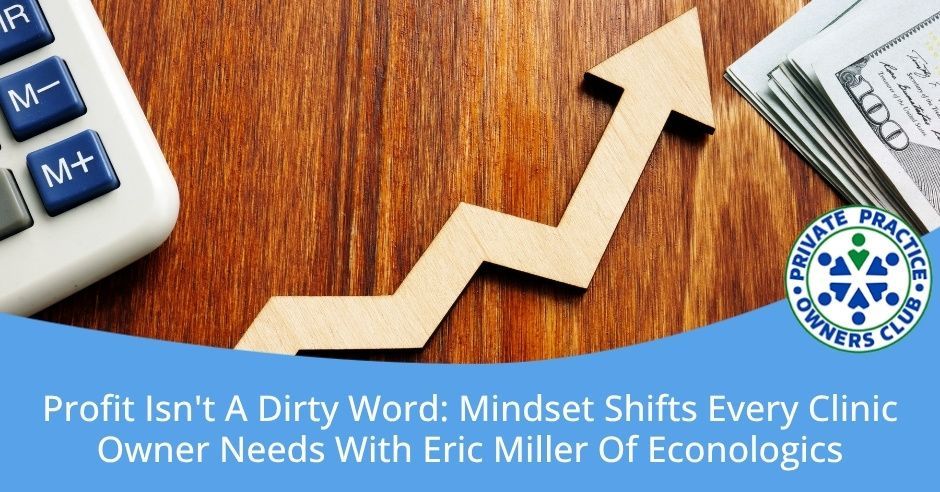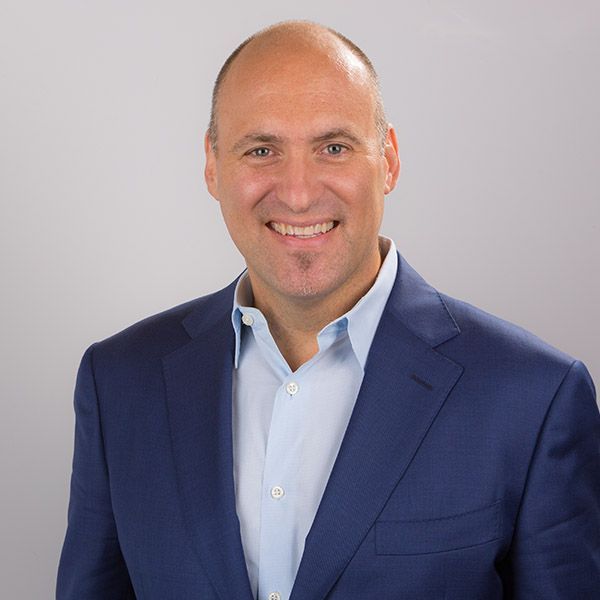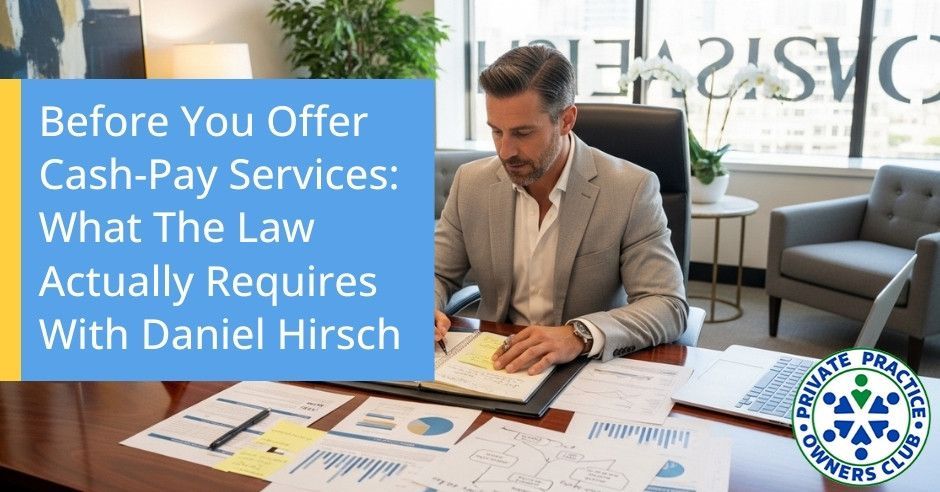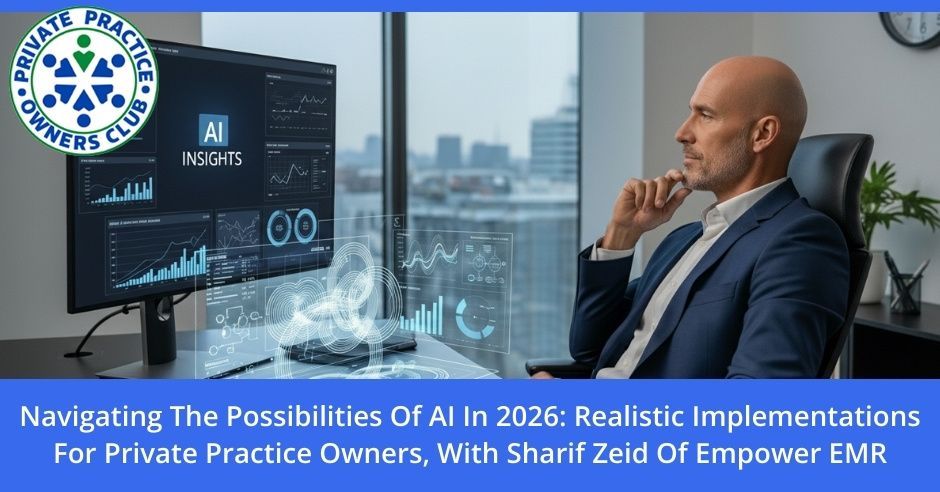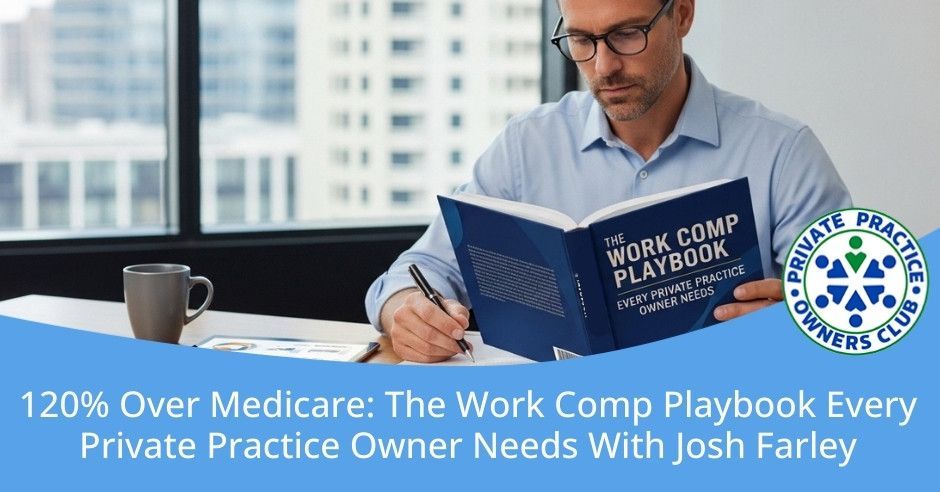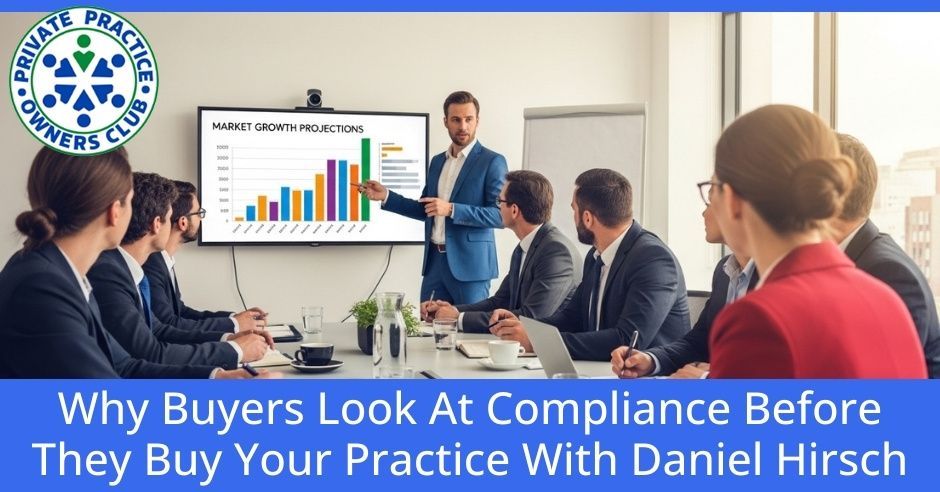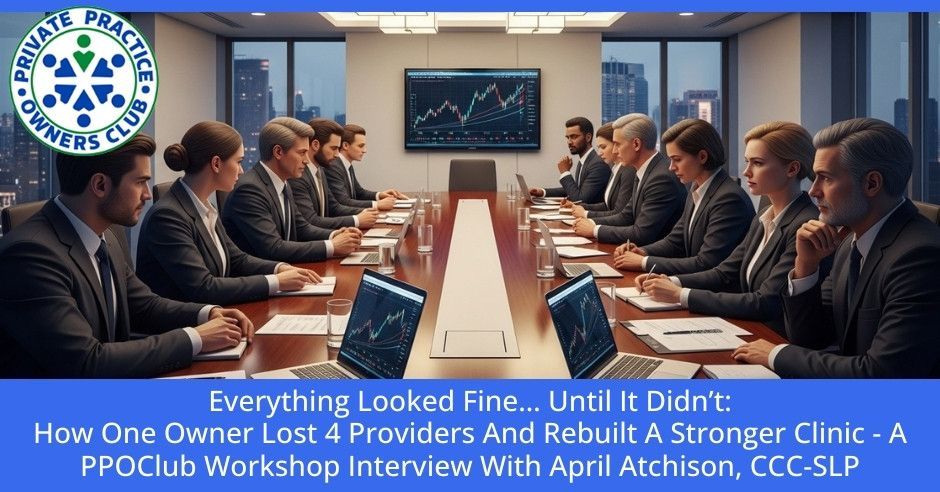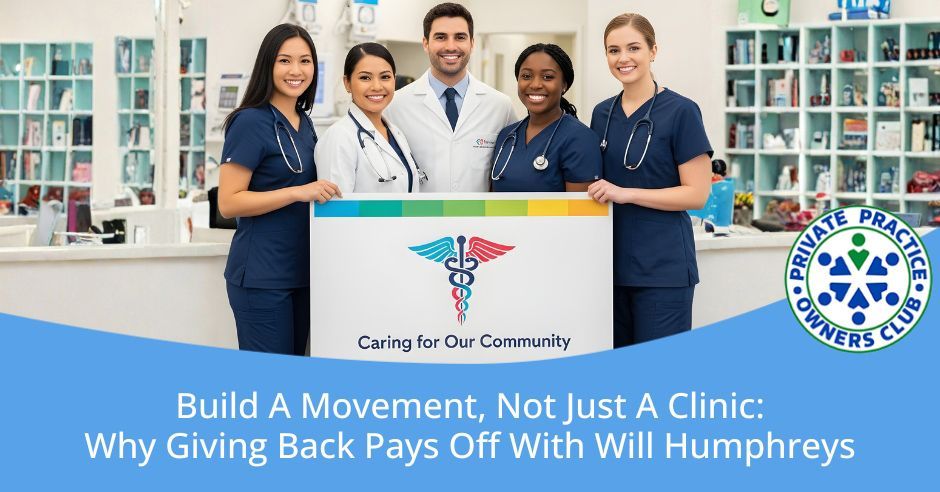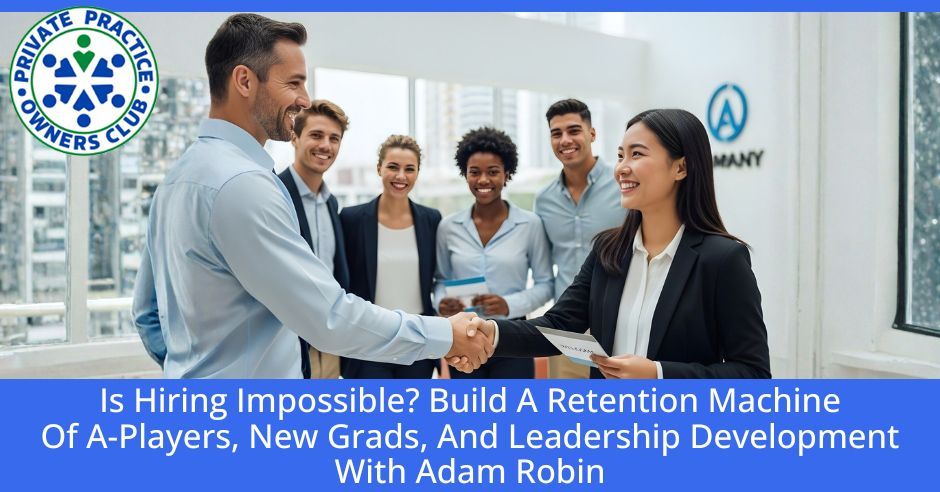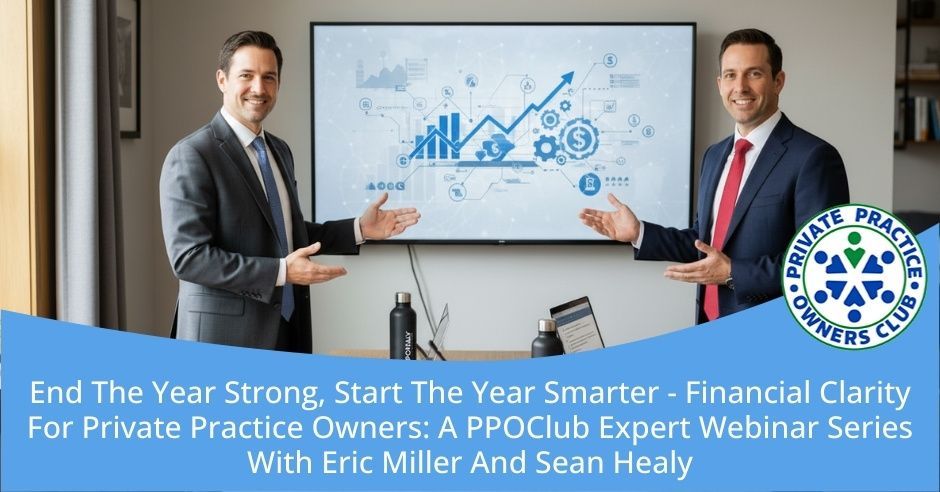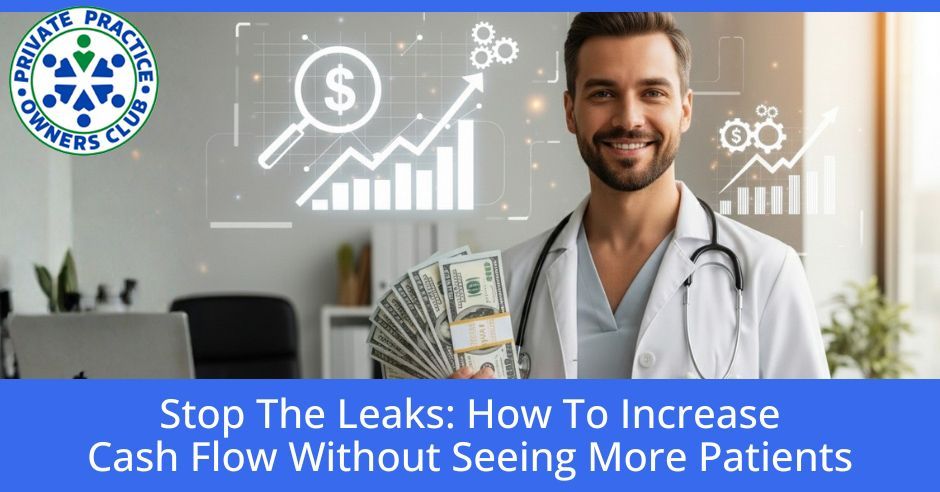Many therapy clinic owners struggle with the idea of making money — as if profit somehow conflicts with patient care. In this episode of the Private Practice Owners Club Podcast, Nathan Shields sits down with
Eric Miller of
Econologics to unpack the deep mindset blocks that keep physical therapy, occupational therapy, and speech therapy clinic owners from achieving real growth and financial freedom.
We discuss:
● Why profit is essential — not optional — for impact and sustainability
● The hidden beliefs holding back your revenue
● How to adopt the CEO mindset your clinic needs to scale
● Tactical strategies for shifting from scarcity to abundance in your business
Whether you're just starting out or leading a growing team, this episode will help you stop playing small and start building a truly profitable practice — without selling out your values.
To more from Eric Miller and Nathan Shields, be sure to register for the upcoming PPOClub Conference, Oct. 2-4, 2025 in Destin, FL, register now:https://ppoclubevents.com/homepage
---
Listen to the Podcast here
Profit Isn't A Dirty Word: Mindset Shifts Every Clinic Owner Needs With Eric Miller Of Econologics
Welcome to the Private Practice Owners Club. I am Nathan Shields. I've got a longtime guest, a frequent flyer, a guest nineteen times over, and this is number twenty, Eric Miller of
Econologics. How are you doing?
I'm doing great. Twenty times we've done this. I wonder if we had pictures of when we did our
first one, and if we had more hair at that time. I'm going to say it's the same.
We've been going to the same barber this entire time.
We have.
The only person so far amongst the guests who eclipsed you is Will Humphreys.
If I'm going to lose, and I'm going to lose to somebody, it's got to be Will.
It shocked me when I saw the number of times that you've been on, but I get a ton of value. I love having you on and talking about financials anyway, so it's not a big deal to me. I'm like, “Great, we need to have him on more.”
It's a subject that I love to talk about. It's trying to get more of the profession to think about finances as always important. It's the one thing that's going to allow us to expand and survive. When I say us, I mean the profession of PT.
I honestly think that one of the major things that is holding us back is that we're not as profitable. There's not enough money flowing through the industry for us to have a greater impact nationwide.
The acceptance of the profitability of standards keeps going down and down. I'm seeing way more people blindly accept that. Years ago, first, it was 20%, and then it was 15%. Now, I'm hearing a resignation of, “If we get 10%, that would be great.” Pretty soon, I'm going to be wondering if I started hearing people say, “We made a 5% profit margin. That's pretty good.” I'm probably going to be like, “What is going on right now?”
Pull the plug.
We can't lower our standards or expect less just because the industry is broken. That's something that is internally driven. It seems like it's an external thing, but it's more of an internal thing. Profitability is 99% internal, from what I can tell.
I agree. I want to get into this, but I have to plug. One of the reasons, not the only reason, that I have
Eric Miller on is because he's going to be one of our featured guests at the Private Practice Owners Club Conference in Destin, Florida, on October 2 through 4. Make sure you register at
PPOClubEvents.com to get in. By the time this episode comes out, we will be getting close, if not around, the Early Bird Special deadline. You'll want to get on as soon as possible and get registered. Bring a leader with you, bring a team member with you, and use code TEAM100 to get an extra $100 off the registration fees.
It would be great to see more than one person come from your clinics, so you can have a greater impact as you return to your companies. I'm excited to have Eric join us because he's going to talk about growing, scaling, and the financial considerations that you need to have as you're growing your practices, and even looking forward to having multiple practices and whatnot, and how you can do that financially and securely. I have to put that plug in there, but I'm excited to see you talk. You always give great advice at those conferences.
Scaling Your Clinic: Profit Isn't A Dirty Word
It's funny because you say all those things, and I'm like, people, you can scale. You can expand. You can do all those things, and you can still profit from it personally as well. They're not mutually exclusive. There is a tendency to think that, and you hear a lot of people say, “I put every dime into this thing. That's how I scale.” That may have worked, but I've also seen a lot of people who have been able to expand and scale, but also been able to keep the fruits of their labor, pay themselves correctly, and all the other things that you would want to do as your business expands. What we want to teach is that you can have it all. You really can.
To go back to what you were saying about the industry and the resignation towards smaller profit margins, I remember it distinctly. It stood out to me ever since you said it. You have to demand profit from your business. When you said that, it struck me because we take a submissive approach to profit. “I do all this hard work, and then whatever comes to me at the end is a profit.” It’s almost in a passive way. The people who are making money are looking at the metrics, driving things forward, and actively putting action into their being at the cause of their profit margin.
Instead of saying, “After all is said and done, we got 8% profit margin,” someone else with a profit-driven mindset would say, “We did XYZ in order to increase our profit margin by this much percentage and without sacrificing patient results, ethics, or whatnot.” We can do all of that, but looking at the metrics and driving production for the purpose and intention of improving our profits.
We've heard this a lot in the healthcare industry, especially with all the negative news. I don't have any love lost for these big insurance carriers. I do believe that there probably is some evilness in the system, which would be fun to talk about. I don't have any love lost for them. The way that I look at it is that there is a game to be played. When it comes to profit, it isn't a dirty word. I looked it up because I wanted to see where it came from. What's the derivation of the word profit?
Maybe we've talked about this before, but it comes from some Latin that means to expand. It is impossible to expand without it. As much as you hear from employees or anyone who says, “You only care about profits,” you're like, “You’re right, I care about profits a lot.” Those are the owners who look at it as a badge of honor. They look at it as something that they've accomplished. It's like winning the Super Bowl. To have a profitable practice is like winning the Super Bowl. That's how people should look at that.
The percentages are slim.
Exactly. If you're able to do that, you should celebrate. I'd love to be able to shift the industry viewpoint on that term, profits. We go so hard at the insurance companies because we think that they're devil-sucking, lifebloodless, or soulless creatures. All they care about is profits. You have to take some of their viewpoint without sacrificing your soul at the same time to be able to enrich yourself personally, because you should.
There is a different mindset. Maybe it's a little bit more prevalent in the therapy space because we are compassionate. We are empathetic as an industry. Individually, that might be different. That is pretty well spread out throughout the individuals that there's a high level of compassion and empathy, such that we are willing to sacrifice our financial health for the benefit of others who are providing the care for.
There's no doubt about that. I've never seen an owner who wasn't willing to not pay themselves so that their staff could be taken care of. I've never seen that. That's why I always got bothered when people would say, “They're only in it for the money.” I'm like, “I don't know what owners you're talking to because the ones that I talked to would forego a paycheck to make sure that their staff are paid.” There you go.
It's pretty crazy. We're not only willing to sacrifice our financial health. I'm assuming it's due to ignorance, naivety, and the lack of training from any education that we had in the past. We don't look at the financials or don't have an eye towards them on a regular basis. That's why I promote so heavily about making sure that you meet with your CPA or your bookkeeper on a regular basis. Look over the financials, know what the different line items mean, know what your revenue and profit numbers are, month to month and year over year, put together pro formas, do a budget, and all that good stuff. You have to have that as a baseline foundation to know exactly where you're at. Otherwise, you're going off your bank account balance.
You'll never have control. The people who have the most knowledge in an area take the most responsibility and have the highest level of control over the outcome. It's not that difficult. If you know those things, you can be responsible for something, and then you can have a lot more control over it. If you ignore it, don't confront, and you pass it on to somebody else, that's where we've seen people suffer the consequences of doing that.
Solvency: The First Step To Clinic Growth
A lot of the readers are going to be, I would assume, younger owners. Maybe they have singular clinics or a couple of clinics, but they have desires to grow, whether that's internally bringing on more providers or expanding to another clinic, you name it. In those stages, and it was the same thing for me, there are times when you're feeling like, “Where is the profit? If I'm going to grow, I have to invest in this next provider. If I'm going to grow, I need to step back and provide less, so I can focus on the business.” Those all seem like sacrifices in the moment. What do you say to them? What mindset would you encourage them to have as they're in that state or those stages, in regard to that feeling that they have, like, “Where's the money?”
This will probably go into the first big responsibility that you have as an owner, and it is solvency. If you don't have the solvency of an organization, you don't have an organization for very long. I would say to young owners, if you have to prove something to yourself, the first thing that you need to prove to yourself is that you can hold on to money. If you can hold on to money, then that's the first step or the first characteristic of someone ready to take the next step in expansion and scaling. You've got to have money to do those things.
You have to know how to acquire it. You have to know how to expand it, but you have to know how to control it and how to keep it. If I am trying to coach someone who is starting their practice, that's the first thing where I’m like, “Prove to me that you can keep money. Prove it to me.” That's where I'll look at their business accounts and their business savings accounts. If you've been able to retain some money, “Well done. You've accomplished that. You've proven that you know how to control money. We can start looking at how we expand it even more.”
That will get into investing in expansion, new people, and those things, but you have to have that dialed in first. Otherwise, what's going to happen is that you're going to get stuck. You're then going to be like, “I don't have any money. What do I have to do? I'll go borrow some.” That gets into the debt scenario, which I don't think most people want to do. You should be able to organically grow without having to go into burdensome debt for that.
You should be able to organically grow without going into burdensome debt.
I'm assuming you're talking about maybe after some initial debt that you take on to open the practice.
Absolutely.
You're probably taking on some initially to float yourself for a few months, but you're saying beyond that, “I've been open a year or two. Things are tight. I might have to get another. I might have to max out this credit card or take out a line of credit, and use it.” You're talking down the road.
To start anything up, there's going to be a risk that you're going to have to borrow money to do so or use your capital if you have it, or whatever. I'm talking about after you started the business. You're starting to see some results, and you're starting to see some growth. The first thing I would want to prove to myself is that I can hold on to money.
Beyond Cost-Cutting: Smart Money Allocation For Growth
When you say hold on to money, the first thing I think about is to be aware of costs and cut back on expenses. To be fair, I don't think you're necessarily saying that. Be mindful of expenses, but I also remember you saying this. “You can't cut expenses all the way to wealth.” Cutting expenses can only go so far. I think what you're also saying in conjunction with that is you need to prove that you can generate revenue beyond those expenses at a healthy margin. That includes marketing well, getting people in the door, billing optimally, and collecting optimally all the cash that you deserve to get. It's a combination of those things.
It is an intelligent allocation of money so that you know where $0.99 of that dollar is going to go before it comes in. It is when you can demonstrate to yourself that you can do that, when you can control the dollar when it comes in, so that “I know X amount is going here, X amount is going here, and X amount is going there.” It's not always going to be peaches and cream, and there's going to be difficulties and such. Generally speaking, you're able to do that. You've learned about financial management. Once you have control over that, it's one of those things where I've seen people who have good financial control. For whatever reason, they're able to expand more easily than others. The people who never had financial control always have a tougher time.
When you control the dollar as it comes in, you're able to expand more easily.
They are always wondering where the money went.
What I'm talking about is dialing in that perspective.
When you're saying control, having that control entails knowing your KPIs, knowing your breakeven points, and building in 10% profit to that breakeven point. It is not just knowing the KPIs, tracking the KPIs, pushing those KPIs to be met and exceeded in some cases, but then also setting aside money. It’s not just taking distributions whenever things are fruitful, but setting aside money in certain reserve accounts.
That's right. It does not necessarily always have to dip into it for some reason. Once you've been able to demonstrate that to yourself, that's what I'm talking about, being able to keep money. You've probably given money to people. What's that stuff that was in your hands that you never had control of?
It is slime, like, “Where did this come from?”
Some people treat money like that. They cannot control it. That's what I'm talking about. That is a skill. Once you demonstrate you can do that, it gives you a lot of confidence. I believe it gives you a lot of confidence once you can control something like that. It's the same thing as when you first started treating people. When you first get out of school, and you're treating people, you're like, “Am I going to be any good at this?” At some point in time, you got good at the control aspect of people. That gave you a lot of confidence. I want to teach people that you can do the same thing with money. You just have to learn how to control. Once you do it, your confidence level goes up so high. You're like, “I know I can control this now. No problem.” You start to see the benefits.
I see this quite a bit. What do you say to those people who have been able to control some money and shown the ability to generate a profit and set aside money in the reserves, but you and I both know that growth requires cash? It's almost contradictory. You're telling them to control the cash and maybe have it, acquire it, and keep it. When it comes to the growth phases, you're telling them, “You've got to part with it.”
I think there's a contradiction there. For me, that's hard. Finances are a trigger, both in a good and a bad way. I love acquiring it. Now, you're asking me to expense it into additional team members, the front desk, or another provider, and maybe expanding the clinics to another location. That's going to be a necessary cash outflow. What do you tell them in those situations? How do you flip that switch and mentality?
Investing In Growth: Why Expansion Is Key To Higher Multiples
I'll show them that if you do this, then the dollars that you see right now in your bank account are going to pale in comparison to what you're going to have if you do this. Whatever you have in there right now, let's multiply that by two or three times. That is what you could have. Not only that, but every dollar of profit that this expansion is going to create is going to have a multiple multiplied by that. I'm seeing anywhere between five and nine times your profit of what practices are selling for.
Are you really?
Yes, absolutely.
It used to be maybe in the 3 to 5 range.
If you're doing internal transfers, or if you have one location or something like that, maybe. If you're scaling and trying to get multiple practices, there's no doubt those numbers are available right now. I would try to show them from an investment perspective what the potential now is going to provide for them by doing. That usually will give people more confidence in doing so.
The focus tends to be specifically on the salary. I'm going to pay them how much to come on and join me. You train these people up to be productive. When they are productive, they are generating around three times their salary and revenue. Outside of the salary, your expenses probably haven't changed significantly. They're going to go up a little bit, but not significantly, because you're already covering the rent, some support staff, the EMRs, fees, and all that stuff. All that stuff is going to stay relatively the same, maybe increase a little bit more, but it's not going to increase three times like their salary will generate. That can filter down to the bottom line.
It's hard for people to make that switch. They see the salary of bringing someone on, wherever they are in the organization, as strictly an expense, but not as an investment. Maybe they have to go through it once or twice before they believe it, but all of us started as solo practitioners at some point, and we survived. We made it through. We brought on people. We paid their salaries when we didn't think we had the money to do it. All of a sudden, the money that was in the account paled in comparison after the fact.
You're going to get burned. Maybe you are going to bring on someone who doesn't pan out. All these things are going to happen, but that's the enjoyment part. That is the overcoming of obstacles to a known goal that you are going to achieve. That is where the payoff is. The payoff isn't going to be when you sell for $3 million to $4 million or $5 million. That's great. I want everyone to do that. I want them to be able to do that, but the path is going to be in the fact that no one thought that you could start this thing. No one thought you could expand this thing.
You're showing people that you can do this. Your service is wanted. You are going to help a lot more people. You have to turn it into something purposeful. The money will be like, “Fine.” The money will come when that happens. You have to unfix yourself from the money part of it a little bit and go back to, “What is our purpose here?” What are we trying to do? What's your own goal? If your own goal is to keep it at a $750,000 practice and eek out a living, do that. You shouldn't be going to the PPO Club if that's what you want to do.
That's true. You're in the wrong place. We're not going to let you settle. There is a part of me that feels like standing up at the beginning of the conference and saying, “If you're here to stay in a one-clinic business, you need to leave right now. This isn't for you.”
You're going to be rather uncomfortable here. If you're okay with that, then that's okay.
Overcoming The Fear Of Growth And Failure
I have my perspective, but what do you see when you're talking to these owners? What is holding them back from growing and scaling generally? Have you already mentioned it? Is there a mindset?
It goes back to no one has done it before. It's that fear of making a mistake.
They haven't done it before, so they don't have confidence in the process.
I don't think they want to make a mistake. No one wants to make a mistake. No one wants to start a practice in some new area that is unproven, take that risk, and then fail. Chances are you're going to do that, but I have news for you. In the game of life, you only have to be right 51% of the time. You don't have to be right 100% of the time, and you're not going to be. You're going to have a bad hire.
You only have to be right 51% of the time in the game of life.
You're going to expand in the wrong location one time. Maybe you're going to have a bad front desk hire. You're going to take on an insurance carrier that you probably shouldn't have. Minimize those bad decisions. The purpose of going to these events, and I know some of the speakers that you're going to talk to, you're going to be talking to a lot of winners, guys that have won, but also people who have had their share of losses, big ones.
They didn't get to where they are by a nice steady upward climb to the right. They went through a lot of bumps in the road. That's for sure.
Any real champion that I've ever seen had points in time where they got their butts kicked badly. It's overcoming, and that's a known obstacle that's going to happen. Maybe that's what people are afraid of. I would be afraid of that, too.
There's a fear there for sure. It can be paralysis by analysis. It can be the fear of failure.
I don't want to bankrupt my household. I don't want to jeopardize my family. I see all these things.
What I see very often is that they see the annual salary figure. It’s almost like they envisioned that being what they have to pay next month.
It's like, “Oh my God, it's $70,000.”
“How am I going to come up with that next month? Let's scale it back a little bit.”
They've got to break it down on a monthly basis so they can see. You don't owe the entire $70,000 salary next payroll, just so you know. They do need to factor it in. I've done that, too. When we're talking like, “We're going to add this much payroll.” I'm like, “Let's break it down. How much is that?”
“How many clients, how many patients, and how many visits do I need to see in order to cover that? Is that doable? What marketing things do we need to do to get that number of patients in?” It's doable once you start breaking it down, but those worst fears that we have rarely come to fruition. It's never as bad as we think it will be. I try to tell people, “If you're making a decision that is in line with your purpose, falls in line with your values, and is a good business decision, you're never going to be 100% confident.
Follow the process in your recruiting processes or in your business decision-making processes. You know your numbers, like you're talking about. You make the best-informed decision and move forward in confidence. Who knows? It could go wrong. Hopefully, by that point, you've already understood what plan B is. That $70,000 salary, maybe after three months, it didn't work, but you didn't pay $70,000. It wasn't a $70,000 failure at that point. It was the salary at that point.”
You've already built a machine where money is continuing to come in right now. You're still seeing patients. It's going to take a lot for someone to be in a position where they're in financial ruin. That takes a lot of time. I've seen people get into financial ruin. It happens quickly, but it was because of things that they've been doing for ten years that led to that. A civilization doesn't just collapse. The collapse happens overnight, but the things that led up to it are hundreds of years in the making. Remember that when you're going to make a big decision. That's not going to break you.
The Value Of Financial Professional
If people wanted to reach out to you and learn more about you and Econologics, how do they do that?
They can go to
EconologicsFinancialAdvisors.com. They can go to the website and take assessments. We'll be happy to do intro calls with them and go over. It's a good use of time, too. How often do people get to sit down and talk with financial professionals to go over numbers, how those relate to their household, and what their numbers need to be? That's probably one of the biggest and most satisfying things that we do for people, which is completely free. It doesn't cost you anything. Get some stability of, “What is the game of what I need?” I can work backwards from there. We do that all the time. It's part of our job as financial advisors. I have to give you a number. “This is what you need.” We can work backwards from there to figure out what you need to do to create that.
It's interesting. Many owners in the same vein are flying blind with their clinics. They don't know what their numbers are or what their number is. What's your number to get out of that? Is it a visit total? Is it a dollar amount? What does it even mean? Like I said before, what's your break-even? What's your baseline minimum number? What is that?
Does it surprise you how many people don't know that number?
They don't know. They have general ideas.
Does it surprise you, though, how many people don't know that number?
At this point, no. I'm expecting that they don't know. I've talked to enough people that I'm not expecting them to know their break-even number very well.
Why don't you guys do us a favor and surprise us every once in a while, and know your numbers before you come talk to us?
I'll invite anybody. If you know your break-even number, and don't give me some round figure like 500 visits, email it to me,
Nathan@PPOClub.com. I would love to know what your break-even number is.
If you guys do that, I will send you a free copy of my book. Depending on whether it's correct, we will 100% do that. I'll give you a free copy of my book.
I'm excited to see you at the conference. I know you're going to bring a ton of value. If you liked this conversation that I had with Eric, come to the conference in Destin, on October 2 through 4.
PPOClubEvents.com, you can register there. Bring some other team members with you with a TEAM100 code, and get another $100 off for them. Thanks for joining me, Eric. It was good to have you on, as always. Celebrations for number twenty. You're a big deal.
Thanks, brother.
We'll talk to you later.
About Eric Miller


